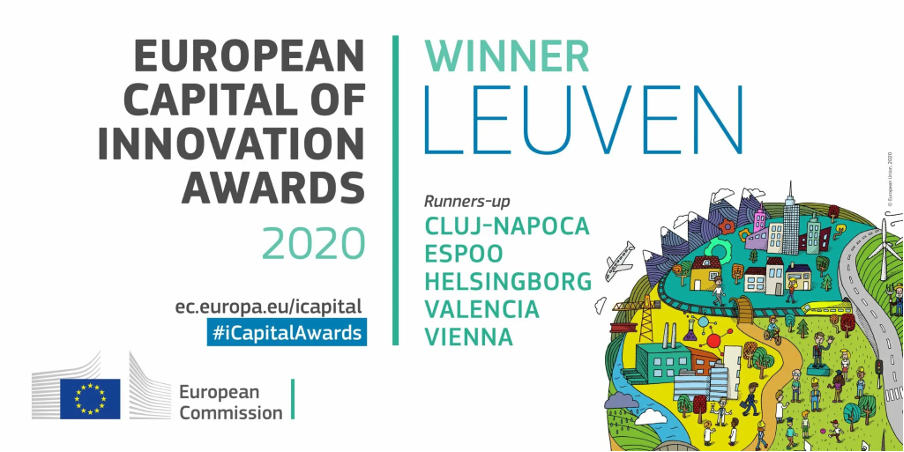European Capital of Innovation Award 2020
The award recognises Leuven’s excellence for developing and implementing innovative concepts, processes, and governance models – enabling a framework that makes innovation happen. brings ideas to life.
The city aims to become one of Europe’s Labs of the Future through a mission-oriented model that facilitates collaborative innovation. Different groups of stakeholders come together, with the common purpose of innovating around complex challenges from climate change and the shift to a circular economy to ensuring high-quality education and care. Leuven is not only providing increased opportunities for innovating to its citizens but also actively involving them in testing their ideas in the city.
The city of Leuven in Belgium is the European Capital of Innovation 2020. The award recognises Leuven’s excellent innovation concepts as well as processes and governance models creating a framework that brings ideas to life. The municipality will receive a €1,000,000 prize funded under Horizon 2020, the EU research and innovation programme. The five runner-up cities – Cluj-Napoca (Romania), Espoo (Finland), Helsingborg (Sweden), Valencia (Spain) and Vienna (Austria) – will receive €100,000 each.
What is the European Capital of Innovation (iCapital) Award?
This is an annual cash prize awarded to the European city that is best able to demonstrate its ability to harness innovation to improve the lives of its citizens.

In particular cities that
- contribute to open and dynamic innovation ecosystems
- involve citizens in governance and decision-making
- use innovation to improve the resiliency and sustainability of their cities
The award recognises Leuven’s excellence for developing and implementing innovative concepts, processes, and governance models – enabling a framework that makes innovation happen. brings ideas to life.
Why is there a prize?
This prize enables European cities to showcase their contribution to developing local innovation ecosystems for the benefit of businesses and the wellbeing of their citizens.
Prize value
€1 million to the city named European Innovation Capital of the year.
€100,000 to each of the five runner-up cities.
The award also recognises a number of finalist cities specially acknowledged for their efforts in promoting innovation.
Who can apply?
A city can apply as long as it
- has at least 100,000 inhabitants
- is in an EU country or a country associated to Horizon 2020, the EU’s research and innovation programme
Award criteria
Cities are judged on how they implement innovative solutions to societal challenges. These solutions can be completed or ongoing, but must have been implemented in the year prior to the opening of the contest or the contest year itself.
Cities will have to show how they created the conditions for innovation by
- experimenting innovative concepts, processes, tools, and governance models as a test-bed for innovation
- engaging citizens in the innovation process and ensuring the uptake of their ideas
- expanding the city’s attractiveness to become a role model for other cities
- empowering citizens by bringing concrete and measurable added value through the implementation of innovative practices
Applications are judged by a panel of independent experts from across Europe.
How to apply
Cities can apply for the contest online. The full details are explained in the following documents.
Contact
For more information please contact us at rtd-i-capital@ec.europa.eu
Mariya Gabriel, Commissioner for Innovation, Research, Culture, Education and Youth announced the European Capital of Innovation 2020 at the European Research and Innovation Days on 24 September 2020.
finalists of this year’s edition are (in alphabetical order):
- Cluj-Napoca (Romania)
- Espoo (Finland)
- Ghent (Belgium)
- Groningen (The Netherlands)
- Helsingborg (Sweden)
- Leeuwarden (The Netherlands)
- Leuven (Belgium)
- Linz (Austria)
- Milano (Italy)
- Reykjavik (Iceland)
- Valencia (Spain)
- Vienna (Austria)
A high-level jury of independent experts selected the 12 finalists by analysing how cities use innovative solutions to respond to societal challenges, how they use such practices in the urban development process and how they engage broad local communities in decision-making.
